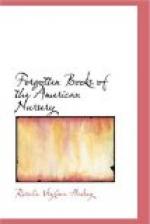“A day or two after, Mr. Belford [a friend] was sent for, and immediately came; at his entrance he saw the Colonel kneeling by her bed-side with the ladies right hand in both his, which his face covered bathing it with tears, though she had just been endeavoring to comfort him, in noble and elevated strains. On the opposite side of the bed was seated Mrs. Lovick, who leaning against the bed’s-head in a most disconsolate manner, turned to him as soon as she saw him, crying, O Mr. Belford, the dear lady! a heavy sigh not permitting her to say more. Mrs. Smith [the landlady] was kneeling at the bed’s feet with clasped fingers and uplifted eyes, with tears trickling in large drops from her cheeks, as if imploring help from the source of all comfort.
“The excellent lady had been silent a few minutes, and was thought speechless, she moving her lips without uttering a word; but when Mrs. Lovick, on Mr. Belford’s approach, pronounced his name, O Mr. Belford! cried she, in a faint inward voice, Now!—now!—I bless God, all will soon be over—a few minutes will end this strife—and I shall be happy,” etc. Her speech was long, although broken by dashes, and again she resumed, “in a more faint and broken accent,” the blessing and directions. “She then sunk her head upon the pillow; and fainting away, drew from them her hands.” Once more she returned to consciousness, “when waving her hand to him [Mr. Belford] and to her cousin, and bowing her head to every one present, not omitting the nurse and maid servant, with a faltering and inward voice, she added Bless—Bless—you all!—”
The illustrations, in comparison with others of the time, are very well engraved, although the choice of subjects is somewhat singular. The last one represents Clarissa’s friend, “Miss Howe” (the loyal friend to whom all the absent letters were addressed), “lamenting over the corpse of Clarissa,” who lies in the coffin ordered by the heroine “to be covered with fine black cloth, and lined with white satin.”
As one lays aside this faded duodecimo, the conviction is strong that the texture of the life of an old-fashioned child was of coarser weave than is pleasant to contemplate. How else could elders and guardians have placed without scruple such books in the hands of children? The one explanation is to be found in such diaries as that of Anna Winslow, who quaintly put down in her book facts and occurrences denoting the maturity already reached by a little miss of eleven.
FOOTNOTES:
[73-A] Winsor, Memorial History of Boston, vol. ii, p. xix.
[80-A] Cross, Development of the English Novel, pp. 38, 39.
CHAPTER IV
1776-1790
The British King
Lost States thirteen.
The New England Primer,
Philadelphia, 1797
The good little boy
That will not tell a lie,
Shall have a plum-pudding
Or hot apple-pye.
Jacky Dandy’s Delight,
Worcester, 1786




